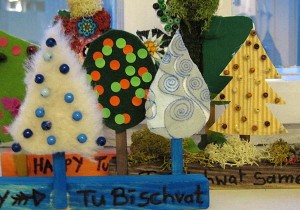The significance of holidays isn’t just getting a few days off of work and school.´This holds true as much in Israel as elsewhere. Tu bi-Shevat, the “New Year’s Festival of the Trees,” which falls this year on 26 January, fails to meet the admittedly not always religious criterion of holiday.
But Israeli children at least have to spend the day in nature, because the custom on Tu bi-Shevat is to make an excursion into the country to plant trees. Most look forward to it; for some, however – and I as a child was included in this latter group – it’s a relief when the cultivation of trees is replaced by some other form of togetherness in the shelter of the classroom.
In fact, in the last fifteen years the tradition of planting that had already been nurtured by the Zionist movement has been increasingly augmented by a new tradition, that of the Tu bi-Shevat seder, whose name alludes to the seder (Hebrew: order) at the beginning of Passover. → continue reading
